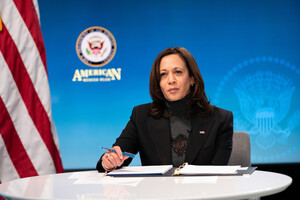Harris criticized Beijing for putting pressure on its neighbors.

US Vice President Kamala Harris said that the United States will continue to strengthen “unofficial ties” with Taiwan and support the island's self-defense, accusing Beijing of trying to undermine the status quo in the Taiwan Strait, the South China Morning Post reported.
While on a visit in Japan, Harris said Beijing has undermined the rules-based international order and “used its military and economic power to pressure and intimidate its neighbors.”
“We expect continued aggressive behavior from Beijing as it tries to unilaterally undermine the status quo. We will continue to oppose any unilateral change to the status quo. And we will continue to support Taiwan's self-defense in accordance with our longstanding policy,” she said.
“Taiwan is a dynamic democracy that contributes to the global good, from technology to healthcare and beyond. The United States will continue to deepen our informal ties,” Harris added.
She emphasized that stability and peace in the Taiwan Strait is an “essential feature” of a “free and open Indo-Pacific region,” and noted that the U.S. will continue to operate in the region “without fear.”
Last week, U.S. President Joe Biden said the country would defend Taiwan if attacked by China, as tensions escalated after US House Speaker Nancy Pelosi's visit to the island.
Beijing regards the island as part of its territory and has never ruled out using force to gain control over it. Chinese Foreign Minister Wang Yi reaffirmed Beijing's resolve at the UN General Assembly last week, saying only Beijing's reunification with the island would bring peace in the Taiwan Strait, warning the US of conflict if it continued to interfere. p>
Most countries, including the US, do not recognize Taiwan as an independent state. Washington, however, opposes any attempt to seize the island by force.
Earlier this month, the US State Department approved a $1.1 billion arms sale to Taiwan, angering China, which has sent five warships and four aircraft, including two J-10 fighter jets, to the strait.
< p>This week, Harris was in Japan for the funeral of the country's former prime minister Shinzo Abe, and also met with Abe's successor, Fumio Kishida. Harris criticized Beijing's “irresponsible provocations” in the Taiwan Strait.
She also met with Australian Prime Minister Anthony Albanese. Australia has pledged more cooperation with the US to speed up the acquisition of nuclear submarines under the AUKUS pact.
Harris will also arrive in South Korea, where she is expected to become the first senior figure in the Biden administration to visit the demilitarized zone.
In response to Harris' comments, Chinese Foreign Ministry spokesman Wang Wenbin called on the United States to “clearly reaffirm the one-China policy,” adding that Beijing's response to Pelosi's visit was “reasonable and lawful.”
Before her visit to a US naval base in Japan, Harris held talks with Japanese companies including Tokyo Electron, Nikon and Fujitsu and called on US and Japanese firms to “diversify” their supply chains.
China has recently become a target. a number of US restrictions on the semiconductor industry. The new US Chip and Science Act bans US companies from building chip factories in China. Leading companies such as Nvidia have already been banned from selling chips to China.
Also read: North Korea launches ballistic missile ahead of US vice president visit to South Korea
Earlier it was reported that US is considering sanctions against China to deter Beijing from invasion of Taiwanand the EU is under diplomatic pressure from the island. Taiwan calls on the EU to warn Beijing of the consequences if force is used.
Related video
The visit of the Speaker of the US House of Representatives Nancy Pelosi to Taiwan, which should have indicated the winners and losers due to the urgency of the developments, left these seats vacant. Why? Read in Natalia Butyrska's article “Nancy Pelosi's visit to Taiwan: will there be a big war.” >US lawmakers step up pressure on big banks over ties to China and Taiwan – ReutersAlso in the US, there is now pressure on defense companies to get rid of any dependence on Chinese materials for the manufacture of weapons. Pentagon forces defense companies to limit use of Chinese supplies – WSJ The discovery of Chinese-made alloys in F-35 jets has put US officials on alert as they try to limit vulnerabilities in the context of China. China to introduce sanctions against the heads of US defense companies due to the supply of arms to Taiwan The Chinese Foreign Ministry spokesman said that the sanctions are being introduced to protect the country's sovereignty and security interests. US and Japanese defense ministers discussed deterrence of China and Russia The parties agreed to cooperate to maintain international order. The US is considering introducing sanctions against China to prevent an invasion of Taiwan – Reuters The discussion of sanctions began even after the Russian invasion of Ukraine.




